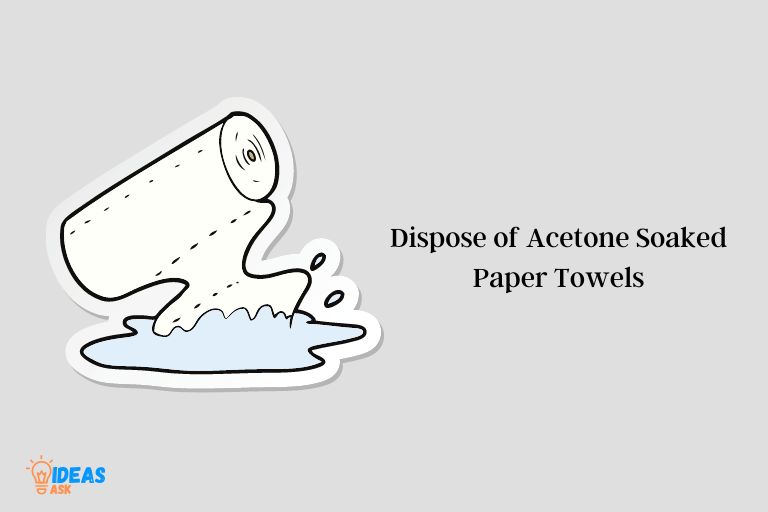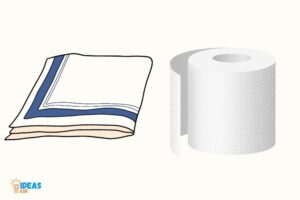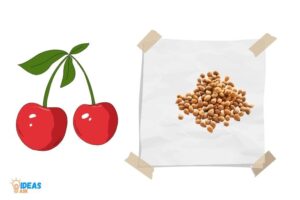How to Dispose of Acetone Soaked Paper Towels? 4 Method!
To properly dispose of acetone-soaked paper towels, place them in a sealed, nonflammable container and take them to a local hazardous waste facility or contact your local waste management service for proper disposal guidelines.
Acetone is a highly flammable and volatile substance commonly used as a solvent in various industries.
When it comes into contact with paper towels, it can create a hazardous waste, and therefore, it is crucial to follow proper disposal methods.
Improper disposal of acetone-soaked paper towels can lead to fires, environmental pollution, and health hazards.
Proper disposal of acetone-soaked paper towels is essential for maintaining a safe environment and preventing damage to ecosystems and water supplies.
By following recommended guidelines and contacting your local waste management service, you can ensure that hazardous waste is handled responsibly and reduce the risk of fires and other accidents.
Always prioritize safety by using sealed, nonflammable containers when disposing of potentially dangerous materials.
4 Easy Method to Dispose of Acetone Soaked Paper Towels
| Method | Description | Safety Precautions |
|---|---|---|
| Air dry | Lay the acetone-soaked paper towels flat in a well-ventilated area, away from heat or open flames. | Ensure proper ventilation, avoid inhaling fumes, and wear gloves. |
| Use a closed container | Place the paper towels in a sealed container, such as a metal can with a tight-fitting lid. | Store the container in a cool, dry area, away from heat and flame sources. |
| Dispose at a hazardous waste facility | Bring the acetone-soaked paper towels to a local hazardous waste disposal facility. | Contact the facility for proper packaging instructions and handling. |
| Utilize a fire-safe container | Put the paper towels in a fire-safe container that has a self-closing lid, such as a safety can. | Keep the container away from heat, sparks, and flames. |
Key Takeaway

Five Facts About Disposing of Acetone Soaked Paper Towels
Understanding The Hazards Of Acetone Soaked Paper Towels
Acetone is a highly flammable and volatile organic compound that’s commonly used as a solvent in various industries such as manufacturing, printing, and cleaning among others.
If you’ve ever used acetone-soaked paper towels to wipe up spills or clean your tools, you already know that they can be quite handy.
However, what most people don’t realize is the potential hazards that these seemingly harmless paper towels pose.
We’ll explore what acetone soaked paper towels are and discuss the hazards, including potential health risks and environmental concerns.
What Are Acetone Soaked Paper Towels?
Acetone soaked paper towels are just what they sound like – paper towels that have been saturated with acetone. These paper towels are often used for cleaning up spills, wiping surfaces, and removing paint or glue.
Acetone is a strong solvent that can quickly dissolve substances like paint, glue and other chemical compounds, making it an ideal choice for cleaning tough stains.
Why Are They Hazardous?
Acetone soaked paper towels are hazardous because they pose numerous risks to both human health and the environment.
Some of the potential hazards associated with acetone soaked paper towels include:
- Highly flammable: Acetone is highly flammable and can ignite easily. When the paper towels are soaked in acetone, they become highly flammable as well.
- Toxic fumes: Acetone releases toxic fumes that can be harmful to your health when they are inhaled.
- Skin irritation: Acetone can cause skin irritation or even burns when it comes into contact with your skin. When you use acetone soaked paper towels to clean up spills or stains, you are exposing yourself to potential skin irritation or burns.
- Environmental pollution: Acetone soaked paper towels can release harmful chemicals into the environment when they are disposed of improperly. These chemicals can contaminate soil, water, and air, and potentially harm wildlife and plants.
Potential Risks To Your Health
Aside from skin irritation and burns, there are other potential health risks associated with using acetone soaked paper towels.
These risks include:
- Respiratory issues: Acetone releases toxic fumes that can be harmful to your respiratory system when they are inhaled. This can lead to respiratory issues such as coughing, wheezing, and shortness of breath.
- Dizziness and headaches: Exposure to acetone can cause dizziness and headaches, which can be a result of inhalation or ingestion.
- Nausea and vomiting: Continued exposure to acetone can also lead to nausea and vomiting, which can be quite unpleasant.
Environmental Concerns
It’s essential to dispose of acetone soaked paper towels properly to avoid environmental pollution and contamination.
Some of the best ways to dispose of these materials include:
- Proper labeling and storage: Store acetone soaked paper towels in labeled, covered, and fireproof containers.
- Incineration: Incinerate the acetone soaked paper towels at an approved facility with a hazardous waste permit. This is the best way to dispose of them because it reduces the environmental impact and eliminates the risk of releasing harmful chemicals into the environment.
- Recycling: If the acetone soaked paper towels are relatively free of contaminants, they can be recycled. Contact your local recycling center or hazardous waste agency to see if they accept these materials.
Acetone soaked paper towels may seem innocuous, but they can pose severe health and environmental risks if not handled or disposed of properly.
Being aware of the potential hazards, and taking responsible steps to dispose of these materials, can help keep you and those around you healthy and protected.
Preparing For Safe Disposal
Identifying Hazardous Waste Products In Your Home
Before beginning any project that involves acetone, it’s essential to identify all hazardous waste products in your home.
These products should not be mixed with regular trash, but instead, must be disposed of separately, since they can be harmful to people, animals, and the environment.
Here are some commonly found hazardous waste products in your home that deserve proper disposal methods:
- Batteries (photographic batteries, household batteries, etc.)
- Pesticides (insecticides, herbicides, fungicides, etc.)
- Pool cleaners (chlorine, ph adjusters, algaecides, etc.)
- Cleaning products (solvents, acids, bases, waxes, etc.)
- Paint products (spray paint, oil paint, latex paint, etc.)
- Electronics (monitors, laptops, televisions, etc.)
Safe Storage To Avoid Accidents
Safe storage of hazardous waste ensures that accidents are avoided and that the hazardous products are secure until they can be safely disposed of.
Here are some tips on safe storage:
- Store hazardous waste products in their original containers, but ensure that the containers are tightly closed.
- Keep these products in dry locations and away from heat and direct sunlight.
- Store hazardous products away from pets and children.
- Ensure that all containers are clearly labeled with the product name, hazard warnings and date of receipt.
Protective Measures
Protective measures are fundamental in any hazardous material handling process.
Here are some essential protective measures to keep in mind when handling hazardous waste products:
- Never dispose of hazardous waste in regular trash.
- Use gloves and eye protection when handling hazardous products.
- Work in a well-ventilated area to prevent inhalation of chemical fumes.
- Wear a proper mask when dealing with airborne pollutants.
- Remove all flammable materials from the vicinity and extinguish all open flames.
By following these safe methods, you can ensure the safe disposal of acetone-soaked paper towels.
Remember to always use protective measures and never mix hazardous waste with regular trash. Proper disposal is necessary to protect our environment and keep everyone safe.
Methods Of Disposal
Acetone is a powerful chemical commonly used as a solvent for paints, adhesives, and other materials.
However, when it comes to handling acetone-soaked paper towels, it’s important to understand how to dispose of them safely and effectively.
We’ll discuss different methods of disposal, as well as tips for dealing with spills and accidents along the way.
Choosing The Right Container
When it comes to disposing of acetone-soaked paper towels, the first step is to choose the right container.
Here are some key points to keep in mind:
- The container should be made of metal or a heavy-duty plastic, such as high-density polyethylene (hdpe).
- Avoid using lightweight plastics or paper containers, as they may not be able to handle the flammable and potentially hazardous nature of acetone.
- Make sure the container has a tight-fitting lid to prevent any spills or leaks during transportation or disposal.
Secure Transportation
Once you have the proper container, the next step is to transport it safely to the appropriate disposal facility.
Here are some tips to keep in mind:
- Always transport the container in an upright position to avoid any spills or leaks.
- If possible, put the container in a secondary container to prevent any potential leaks from causing damage to other items.
- Do not transport the container in a passenger vehicle – instead, use a vehicle designated for hazardous waste transportation.
There are several ways to dispose of acetone-soaked paper towels, depending on your location and local regulations.
Here are some common methods:
Local hazardous waste facilities
Many cities have facilities that are designed to handle hazardous waste disposal. Check with your local government to find out where these facilities are located and what their hours of operation are.
Mail-back programs
Some companies offer mail-back programs for hazardous waste disposal. They will send you a container that can be used to store and ship the acetone-soaked paper towels to a disposal facility.
Third-party waste disposal companies
There are companies that specialize in hazardous waste disposal. They will come to your location, collect the waste, and dispose of it in accordance with local regulations.
Tips For Dealing With Spills And Accidents
Accidents can happen, even when you take precautions to handle acetone-soaked paper towels properly.
Here are some tips to keep in mind:
- If a spill occurs, clean it up immediately using a suitable absorbent material, such as sand or vermiculite.
- Always wear appropriate personal protective equipment (ppe), such as gloves and goggles, when handling acetone or any other hazardous material.
- If you are unsure of how to properly handle a spill or accident, contact your local hazardous waste disposal facility or a professional spill response company.
It’s important to handle acetone-soaked paper towels with care to prevent accidents and ensure proper disposal.
By choosing the right container, transporting it securely, using the appropriate disposal methods, and taking precautions with spills and accidents, you can dispose of this hazardous waste safely and effectively.
Reducing Your Carbon Footprint
Recycling Vs. Disposing Of Acetone Soaked Paper Towels
Acetone is a potent chemical that is commonly used in nail polish removers and other industrial applications.
Disposal of acetone soaked paper towels requires careful consideration, as it can be a potential environmental hazard if not handled correctly.
Here are some key points to note:
- When you dispose of acetone soaked paper towels, it is essential to ensure they do not come into contact with flame or combustibles, as acetone is highly flammable.
- Disposing of acetone soaked paper towels in general household waste is not advisable and can harm the environment.
- Recycling is an effective way of handling acetone soaked paper towels. Recycling facilities use technology to separate chemicals from the fibres of paper towels and then process them for further use.
Environmentally Safe Alternatives
When you have to use acetone to clean or remove substances, it is possible to use environmentally safe alternatives that do not harm the environment.
Here are some alternatives to consider:
- Use reusable cloths instead of paper towels. Wash and reuse them instead of using disposable towels.
- Environmentally safe solvents that have less impact on the environment can be used as alternatives to acetone. These alternatives decompose easily and are less toxic.
Tips For Conserving And Consistently Maintaining Safe Wastewater Practices
Safe disposal of acetone-soaked paper towels is only one aspect of wastewater management.
Here are some tips that can help you maintain safe wastewater practices:
- Don’t pour acetone down the drain: Acetone should never be poured down the sink as it can harm the wastewater system.
- Use appropriate containers: When storing and disposing of acetone-soaked paper towels and other chemicals, it is necessary to use containers that are designed for that purpose.
- Label all containers: All containers should be appropriately labelled with the contents and any necessary cautionary warning stickers.
- Follow regulatory guidelines: Ensure that you are aware of your country’s regulatory guidelines and regulations on hazardous waste disposal.
- Educate employees: Educate all employees on proper waste disposal and ensure they follow environmentally safe practices.
By following these tips regularly, you will reduce your carbon footprint and contribute to environmental sustainability.
FAQ About Disposing of Acetone Soaked Paper Towels
How Should I Dispose Of Acetone Soaked Paper Towels?
Place the paper towels in a metal container with a tight-fitting lid and label it as hazardous waste.
Why Is It Important To Dispose Of Them Properly?
Acetone-soaked paper towels are flammable and pose a fire hazard if not disposed of correctly.
Can I Dispose Of Acetone-Soaked Paper Towels In The Trash?
No, you should never throw away acetone-soaked paper towels in the regular trash as they are considered hazardous waste.
Where Can I Take Acetone-Soaked Paper Towels For Disposal?
You can contact your local hazardous waste facility or environmental agency for disposal recommendations.
Conclusion
Proper disposal of acetone-soaked paper towels is crucial, not just for the environment but also for your safety. It is always better to be cautious and take the necessary steps to get rid of them correctly.
Keep in mind the potential hazards of the chemicals and use protective gear when handling them. Take note of your local regulations and guidelines in disposing of hazardous materials to avoid any fines or legal repercussions.
Remember to store and transport the materials in a safe and secure manner to minimize the risk of spills and accidents.
With these precautions in mind, you can effectively dispose of acetone-soaked paper towels without any harm to yourself and the environment.
Let us do our part in keeping our surroundings clean and safe by practicing proper waste management.






